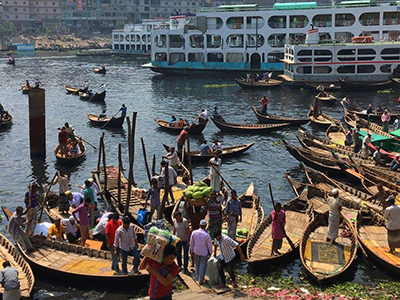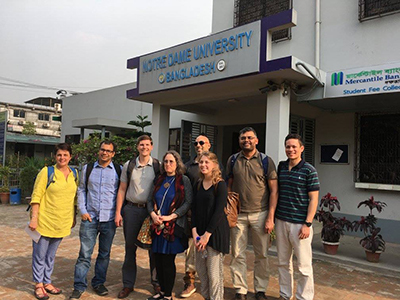The Pulte Institute for Global Development, part of Notre Dame’s Keough School of Global Affairs, has received a $1.4 million grant cooperative agreement from the United States Agency for International Development’s (USAID) Office of Food for Peace to conduct a long-term evaluation of its principal food security programs in Bangladesh.
The Pulte Institute will lead the five-year effort as part of its role with the USAID-funded mechanism Expanding the Reach of Impact Evaluations (ERIE) alongside partners Mathematica Policy Research (MPR) and AidData. The research will explore questions around gender equitable food security and resilience of vulnerable people in Bangladesh, beginning with evaluations of three of Food for Peace’s (FFP) priority food security projects in partnership with CARE International, Helen Keller International, and World Vision.
Using the past to inform the future

Pulte Institute Executive Director.
In the aftermath of the Bangladesh Liberation War in the early 1970’s, the new nation of Bangladesh endured four years of famine that drew world attention. George Harrison organized the famous Concert for Bangladesh to raise relief funds. Henry Kissinger referred to the country as the “world’s basket case.”
“Much has changed in Bangladesh since then”, said Ray Offenheiser, Director of the Pulte Institute, who spent five years living and working in Bangladesh with the Ford Foundation. “Bangladesh now has one of the highest rates of economic growth in the world and, while poverty and hunger persists, the country is today food self-sufficient. Much of this success is due to ambitious investments by the private sector, followed by investments from the Government of Bangladesh coupled with bilateral and multilateral investments.”
Although FFP’s investments have resulted in a significant reduction in chronic malnutrition and increased access to food in target areas, USAID wants to determine how well these outcomes can be sustained without continued intervention.
“Government agencies and NGOs can often see the short-term impacts of their development projects, but it is difficult to know what will happen to a community five years after a project has ended,” said Tom Purekal, Director of the Pulte Institute’s Innovation & Practice Division. “The work that we will be doing with ERIE will allow us to take USAID back in time to see the real effect of their work and provide recommendations for how they can improve future programs to ensure long-term impact.”
Building a Notre Dame presence in Bangladesh

From Left to Right: Jennifer Tank (Biology),
Ashish Sharma (CEEES), Michael Sweikar (Pulte Institute),
Marya Leiberman (Chemistry), Neil Lobo (Biology),
Rebecca Blais (Political Science Undergraduate, '18),
Zain Syed (Fmr Biology), and Marc Muller (CEEES).
Bangladesh has held a special place in the heart of the Notre Dame community since 1949, when the Congregation of the Holy Cross - the same religious order that founded the University of Notre Dame - established Notre Dame College in Dhaka. Since then, Notre Dame College has grown to become one of the premiere education institutions in Bangladesh and was the impetus for the Congregation to establish Notre Dame University Bangladesh (NDUB) in 2013.
In 2017, Notre Dame sent a team of 12 researchers to NDUB to identify opportunities for support and collaboration. Pulte Institute Executive Director Michael Sweikar was among the group on the mission. Following the visit, the Keough School of Global Affairs, with support from the Provost’s Office and Notre Dame Research, awarded seed grants to interdisciplinary faculty researchers from across campus to help develop new partnerships in Bangladesh. The Pulte Institute was awarded one of these seed grants to conduct a series of training workshops with NDUB faculty to increase their knowledge in sustainable business concepts and pedagogical practices.
“The 2017 exchange enabled the Pulte Institute to bring expertise and resources to NDUB that their faculty would otherwise not have been able to access,” said Sweiker, pictured third from left. “This new award will allow the Pulte Institute to return to Bangladesh to build on these collaborations and make a significant impact beyond the classroom, strengthening Notre Dame’s reputation as a leading development partner in Bangladesh.”
Work will begin on the project in March 2020. Pulte Institute researchers Lila Kathiwada and Danice Brown Guzman will support the qualitative and quantitative components of the project respectively, and should continue the post-evaluation work through 2024 to determine the long-term impact of the activities.
The Pulte Institute for Global Development—an integral part of the new Keough School of Global Affairs at the University of Notre Dame—works to address global poverty and inequality through policy, practice, and partnership.
Contact: Heather Asiala, Communications Program Manager, 574-631-0236, h.asiala@nd.edu